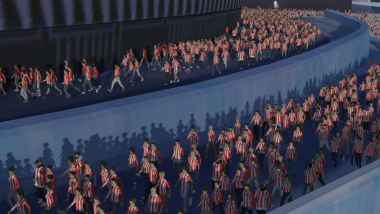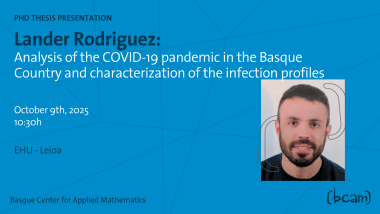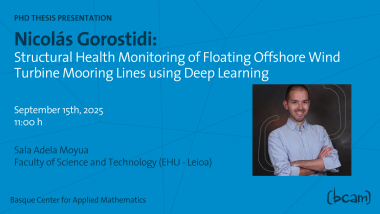BCAM obtains funding for six projects through the PID 2024 CALL from the State Research Agency
- This call is aimed at funding scientific research and knowledge advancement, both in non-oriented areas and in areas oriented towards solving specific problems.
BCAM has successfully obtained funding for six of its research projects through the prestigious PID 2024 (Proyectos de Generación de Conocimiento) call from the Agencia Estatal de Investigación (AEI) / Spanish State Research Agency. This call seeks to strengthen national and international research and promote collaboration between research groups.
• CUMAT PROJECT - PID 2024 156184NB-I00
IP: Jean-Bernard Bru (BCAM - UPV/EHU Ikerbasque Research Professor) and Chiara Boccato (Università di Pisa)
Quantum physics has led to significant innovations, such as the transistor and the laser, and its impact has grown rapidly in recent years, driving a global race for quantum advantage. This research proposal focuses on deepening our understanding of the quantum world through mathematical work, specifically in the interdisciplinary field of Quantum Mathematics. The scientific proposal is structured in three interconnected areas: (a) the mathematical development of quantum many-body problems, (b) their application to physical systems, and (c) the exploration of new areas of Mathematics.
• EBIPHA PROJECT - PID 2024 156267NB-I00
IPs: Pedro Caro (Ikerbasque Research Fellow at BCAM) IP 2: Ioannis Parissis (BCAM - UPV/EHU Researcher)
This is a 4-year research proposal on inverse problems and harmonic analysis. Although each area has its own set of questions and objectives, they share common tools, techniques, and perspectives that create natural and fruitful connections. The research team also includes several young researchers who contribute to some of the outlined objectives. The PIs have extensive experience in the respective areas and in the training and guidance of PhD and postdoctoral students.
• PRETHEXP PROJECT – PID 2024 158994OB-C42
- SUBPROJECT 1: IP 1: Rafael Delgado Buscalioni (Universidad Autónoma de Madrid)
TITLE: Predictive Theoretical-Experimental Integrated-Approaches for Dissipative Process in Soft Matter and Biomolecules - SUBPROJECT 2: IP 1: Marco Ellero (BCAM – Ikerbasque)
TITLE: Multiscale Modeling of Friction, Lubrication, and Viscoelasticity in Particle Suspension - SUBPROJECT 3: IP 1: José (Pep) Español Garrigós (UNED)
TITLE: Dynamic coarse-graining of biological and soft matter systems - SUBPROJECT 4: IP 1: Francisco José Terán Garcinuño (IMDEA Nanociencia)
TITLE: Exploiting dynamical magnetization for probing molecular hydrodynamical phenomena
The PRETHEXP project builds upon previous collaborations between four consortium groups, combining theory, multiscale simulations, and experiments in biotechnological systems. This effort has been funded in recent years through various regional, national, European, and international projects. The goal of PRETHEXP is to develop predictive-theoretical-experimental tools using first-principles theory to feed advanced simulations that replicate experiments without phenomenological assumptions. The project addresses key aspects such as molecular dissipation and viscoelasticity in "soft matter" and "complex fluids," ranging from nano to macro scales, including rigid or soft nanoparticles in dense suspension or near solid surfaces. Furthermore, PRETHEXP investigates the mechanical response of biostructures like proteins, DNA, and viruses in a hydrodynamic environment.
• NCAFA PROJECT - PID 2024 156169NB-I00
IP 1: Daniel Eceizabarrena (Marie Curie Postdoctoral Fellow at BCAM) IP 2: Luis Vega (BCAM-UPV/EHU Professor)
The main motivation for submitting this proposal to the 2024 Generation of Knowledge Projects is to enhance our understanding of the mathematical structure underlying the physical phenomena that govern our environment. This has been one of humanity's oldest ambitions, and today we understand many of these phenomena. However, the rapid technological advancements of recent decades have enabled the observation, measurement, and experimentation of previously unreachable physical phenomena, opening new horizons for physicists and mathematicians. Examples of this include fluid turbulence, vortex filament evolution, and optical events such as the Talbot effect, all of which will be studied in this project.
• PREDISENSE PROJECT - PID 2024 156173OA-I00
IP: Tomás Teijeiro Campo (BCAM Researcher and Ramón y Cajal Fellow)
The Internet of Things (IoT) is a heterogeneous network of billions of connected devices, including applications like package delivery, virtual assistants, and home security. In healthcare, a major revolution is anticipated, known as the Internet of Medical Things, which will shift the current reactive healthcare paradigm to a preventive approach through continuous and personalized monitoring. However, while technologies to acquire physiological parameters already exist, continuous monitoring of a large portion of the population remains unfeasible due to the data volume generated and the high energy consumption of current devices. For example, For example, in practical setups it is frequent to generate tens of GiB of data per day during continuous monitoring of a single subject.
The PREDISENSE project proposes a new paradigm for sensor data acquisition inspired by human perception, aiming to minimize the amount of data captured without sacrificing information quality. Predictive models will anticipate signal behavior and adapt the acquisition process. This approach is based on four pillars: abductive reasoning, self-supervised machine learning, event-based sampling, and Bayesian inference. In addition to exploring new theories on efficient data acquisition, PREDISENSE aims to provide measurable benefits in real applications, particularly in biomedical signal monitoring with wearable devices.
• SINGULAR2025 PROJECT - PID 2024 156181NB-C31
- SUBPROJECT 1: IP 1 COORDINATOR: Javier Fernández de Bobadilla Olazábal (Ikerbasque Research Professor – BCAM) IP 2 COORDINATOR: Ilya Smirnov (Ramón y Cajal and Ikerbasque Research Fellow at BCAM)
TITLE: Algebraic, geometric and topological problems in singularities and cryptography. - SUBPROJECT 2: IP 1: Jorge Martín Morales (Ramón y Cajal Research Fellow at University of Zaragoza) IP 2: José Ignacio Cogolludo Agustín
TITLE: Algebraic, geometric and topological problems in singularities and cryptography. - SUBPROJECT 3: IP 1: Pedro Daniel González Pérez (Universidad Complutense de Madrid) IP 2: María Pe Pereira (Universidad Complutense de Madrid)
TITLE: Algebraic, geometric and topological problems in singularities and cryptography.
Singularity theory has been traditionally shaped by the interaction between areas such as topology, algebraic geometry, Hodge theory, D-modules, commutative algebra, and number theory. This transversal theory has influenced fields like physics, computer science, and cryptography. In the last 20 years, methods like metric geometry and mirror symmetry have provided new tools to study singularities and their degenerations, as well as applications in post-quantum cryptography due to the development of quantum computing.
The research team consists of three groups (BCAM, UCM, and UniZar), with over 30 years of experience in studying singularities and degenerations from a multidisciplinary perspective. This team, with a strong tradition of collaboration, brings together experts in classical aspects of the theory, methods in characteristic p, and cryptography, in addition to being at the forefront of new geometric contributions to the field, such as the proof of the 1970 Zariski multiplicity conjecture.
The group works collaboratively on common objectives, with numerous examples of cooperation among teams and the development of joint doctoral programs. Additionally, shared postdoctoral positions and synergies between research nodes have strengthened the collaboration. Each node is an independent research unit, with its own resources and specific objectives.

Related news
Ikerketa



